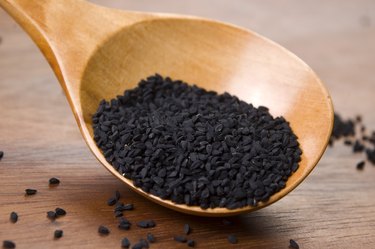
The flowering plant Nigella sativa, native to the Middle East, produces seeds commonly called black seeds or black cumin. People use the seeds in cooking to add spice, and also consume powdered black seed and black seed oil for health benefits, according to Diet Spotlight, a diet and health website. Powdered black seed supplements are available in capsules, as well as oil extract in bottles and softgel capsules. Black seed oil is a good source of essential fatty acids and certain other nutrients.
Nutrients
Video of the Day
Black seed components include amino acids, proteins, carbohydrates, fixed oils, volatile oils, alkaloids, saponin and fiber. Carbohydrates in black seed include the monosaccharides arabinose, glucose, rhamnose and xylose. The seed also contains calcium, iron, potassium, and sodium. Because people generally consume very small amounts of black seed or use the extracted oil as a supplement, there is little nutritional value for the seed itself.
Video of the Day
Fixed Oils
Black seed contains fixed oils consisting of 84 percent fatty acids, notes the Memorial Sloan-Kettering Cancer Center. A black seed oil supplement provides 45 calories per teaspoon, all of them from fat. This includes 22 percent alpha-linolenic acid, an anti-inflammatory omega-3 fatty acid, and 59 percent linoleic acid, an omega-6 fatty acid. Dr. Gabe Mirkin explains that although people tend to consider fish oil as the best source of omega-3 fatty acids, seeds and other plant sources also are beneficial.
Potential
Black seed also contains thymoquinone, which has has antioxidant properties and may have protective effects for the liver, Sloan-Kettering reports. Nigellone in black seed inhibits histamine release and may reduce allergy symptoms.
Research
Research with humans is lacking to confirm health benefits from black seed aside from its beneficial fatty acid content, according to Sloan-Kettering. Laboratory and animal studies indicate that individual components of the seed may have antiparasitic and anti-inflammatory effects and may be beneficial for the immune system. Thymoquinone and other components show anticancer effects in animal studies, reducing the growth and size of tumors.
Dosage
A standard dosage of black seed oil is 1 to 2 teaspoons or 2 capsules per day with food. Two capsules typically provide 1,000 milligrams of black seed oil. Negative effects are rare, but very high doses have caused liver and kidney problems in rats during research, cautions Sloan-Kettering.